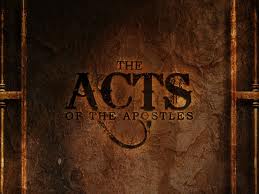Acts
Oft times I have wondered about certain books of the Bible. I have thought, what if we did not have this book in our Bible? How would that affect the whole? When I place the book of Acts on that pedestal, and consider, I am certain of the answer.
Only Acts and Genesis seem to hold the place of absolute. Without them we simply could not survive. They are both irreplaceable.
The book of Acts was written by Luke. Luke is the only Gentile writer in the Bible. It is interesting to me that Luke is responsible for 25% of the New Testament. His two books equal one fourth of the volume of the New Testament.
I am not positive, but it appears to me that Luke wrote at the bequest of a wealthy patron named Theopholis. His two books address this individual. This was a common practice that carried well into the middle ages. A wealthy patron would sponsor someone to write a book or thesis. This is how men like Voltaire and Rousseau were supported financially.
To me, Acts is about three men. Those men are Simon (Peter), Saul (Paul), and Stephen. The book is evenly devoted to the ministry of Peter and Paul with Stephen being the bridge from one to the other.
The contrast of these two men is stark. Peter is a country fisherman. Paul is a polished cosmopolitan. Peter was ignorant and unlearned. Paul was a trained rabbi, having studied at the feet of Gamaliel. Peter spoke Aramaic, the common language. Paul could speak that language, as well as Greek. Peter was a country Jew, Paul was a Hellenistic Jew and a Roman Citizen.
The first twelve chapters of Acts are about Peter. In chapter 13 the spotlight shifts to Paul and never moves back to Peter again. Peter, the great apostle fades from view in Acts.
How important is Acts as a book? It is irreplaceable! Without the book of Acts we would go from the Gospels to Romans. We would wonder who is Paul? What is the church? How did it start? Acts is the link to all of the New Testament.
Acts begins with the ascension of Jesus. It moves on to choosing Judas’ replacement. It then tells of Pentecost, the beginning of the church, and eventually documents the church’s emigration to the Roman Empire.
Christianity conquered the Roman Empire, period. The Roman Empire paved roads, established peace and continuity, and through this open door walked the church. The church flourished during the Pax Romana, the empire wide peace. Within 300 years 10% of the Roman Empire was Christian.
The book of Acts documents the beginning of this conquest of the church.
When the spotlight shifts to Paul in chapter 13, Luke begins to relate Paul’ missionary journeys. Paul made three journeys. ( Some scholars say up to five). The dates of these journeys are:
- 46-48, first journey
- 49-52, second journey
- 53-57, third journey
It is simply amazing that in 47AD there were no churches in Asia Minor. In ten years there was a ring of churches that included every major city in Galatia, Macedonia, Asia and Acacia. This remarkable achievement has never been repeated anywhere globally.
On his first journey, when he gains his first convert, the Apostle Paul jettisons his Hebrew name Saul, and forever becomes know as Paul. He was the Apostle to the Gentiles and he bore his Gentile name to his death.
Luke is a gentile, writing a book about the gentile revival by the Apostle to the gentiles. This fact shows up in the book repeatedly. It is very clear in the story of the appointment of the deacons. When the division came and the controversy showed itself, out of the seven men chosen, 5 were Greeks according to their names. Luke makes this point, or rather the Holy Ghost does.
The final chapters of the book of Acts are concerning Paul’s last days. I am left with one of the biggest questions of my life as to why the book ends so inconclusively. With the Holy Ghost inspiring the man called Luke, why no closure?
My only hypothesis is that the book is still being written in heaven. Maybe the final words were something like “to be continued”.
What chapter will you write to add to the book of Acts?



 Expository Series
Expository Series First Pentecostal Church of Puget Sound
First Pentecostal Church of Puget Sound Savecom
Savecom
I’m glad your writing again.I marvel ,so many times when preachers say,oh you,ve heard this before.I think of people like our new Bro. David,asking what is an alter? Truely the book of Acts continues.Our old songs are new,the word of God is a new book to all of our wonderful new babies.God is so good to live on in his people.
A wonderful message, again! I really like how you ended this post.Thanks, Bro. Bow!
Beautifully written. Your gift is unequaled.
Very well written as usual. I have enjoyed reading your book analysis. Thank you for picking up the electronic pen again.